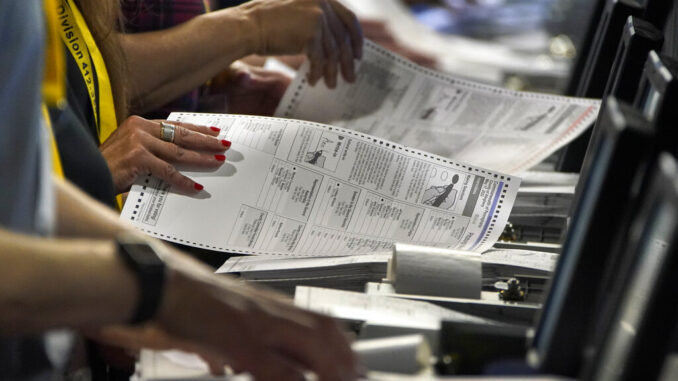

RALEIGH — Multiple General Assembly races have come in with under a 1% margin separating candidates and are headed to a recount, as is the state Supreme Court race.
“Recounts are a regular part of the elections process when contests are close, and they help ensure that the results are accurate and that the public can have confidence that the candidate who received the most votes wins the election,” Karen Brinson Bell, executive director of the North Carolina State Board of Elections, said in a statement. “Recounts are conducted by bipartisan teams and are open to the public whenever and wherever they occur.”
Most of the state’s 100 counties will begin recounts on Nov. 20. All recounts should be completed no later than Nov. 27, per the N.C. State Board of Elections. County-by-county recount schedules can be viewed here.
The House seat recounts could have big stakes; should any of those races land back in the Republican side of the aisle, the party will retain its supermajority in that chamber.
House District 32
Incumbent Frank Sossamon, a Republican, has requested a recount. His opponent, Democrat Bryan Cohn, leads Sossamon by just 233 votes.
House District 25
Democrat Lorenze Wilkins requested a recount after Incumbent Republican Rep. Allen Chesser won the race with 461 more votes than Wilkins.
House District 105
Democrat challenger Nicole Sidman has requested a recount in the Mecklenburg County House seat race that was retained by Republican Tricia Cotham in the unofficial results. With the final canvas for that seat complete, Cotham leads Sidman by 216 votes. Cotham has 27,303 votes to Sidman’s 27,087.
Sidman released a statement on her campaign’s Facebook page saying she had requested a recount, stating in part that the “process is designed to maintain faith in our democratic system of government.”
Cotham made waves in 2023 when she left the Democrat Party and joined the Republicans, giving them a one-vote supermajority. It has been estimated that more than $1 million was spent by Democrats trying to flip the seat.
Senate District 18
Republican Ashlee Adams has requested a recount against Democrat Terrence Everitt, who wound up 134 votes ahead after canvas.
Senate District 42
Republican Stacie McGinn has requested a recount in the race against Democrat Woodson Bradley. Following canvas, Bradley leads McGinn by 204 votes.
Supreme Court Race
The nearly 10,000-vote lead held by Republican Court of Appeals Judge Jefferson Griffin has evaporated. Democrat Associate Justice Allison Riggs, an appointee of Gov. Roy Cooper, had a 623 ballot lead on Griffin as of the morning of Nov. 19.
Unlike past Supreme Court races where provisional ballot totals hovered around the 8,200 range, both candidates have seen the number of those ballots surpass the 10,000 mark.

Griffin has officially requested a recount in the race and has not yet responded to a request for comment.
Both before and after the lead change, Riggs continually sent out email updates to her supporters, some of which implied if she were trailing that she would request a recount. In a press release issued on Nov. 18, Riggs Campaign Manager Embry Owens called recounts “a normal part of the election process” and they “show our democracy at work.”
The current Supreme Court makeup stands at five Republicans and two Democrats, including Riggs. If a recount goes to Griffin, the court will shift to a 6-1 majority.
The recount is not the only action in the Supreme Court race. The North Carolina Republican Party (NCGOP), along with Griffin and his campaign, have filed a lawsuit against the N.C. State Board of Elections (NCSBE).
The lawsuit claims the NCSBE failed to produce documents and data related to the Supreme Court contest that were requested starting Nov. 5. The lawsuit says some information has been received but that data supplied from county boards of elections shows the NCSBE record production is incomplete.
“The State Board of Elections has not earned any benefit of the doubt regarding their actions and their slow walking of critical information against increasingly tighter time frames illustrates why this lawsuit was filed,” NCGOP Chairman Jason Simmons said in a statement. “We will keep all options available as needed to ensure their compliance with state law.”
The lawsuit says there are four outstanding requests:
- Suspected cases where voters have cast both absentee ballots and in-person ballots
- Voters who used curbside voting on Election Day
- Full lists of felony convictions along with the datasets and guidance given to local county boards of election on the treatment of votes cast by convicted felons
- Full lists of deceased voters as well as the datasets and guidance sent to local county boards of election on how to handle ballots of deceased persons
The lawsuit asks for the courts to compel the NCSBE to produce the requested information as well as asking for attorney costs and court fees. In addition to the lawsuit, the NCGOP has filed for a temporary restraining order asking the courts to expedite review of the case in order to compel the NCSBE to produce the records.
North State Journal reached out to the NCSBE for comment on the lawsuit and is awaiting a response.
Late on Tuesday afternoon, Griffin announced via an NCGOP press release that he was filing election protests “challenging the validity of more than 60,000 ballots across the state.”
“As North Carolinians, we cherish our democratic process. Protecting election integrity is not just an option—it’s our duty,” Griffin said in the press release. “These protests are about one fundamental principle: ensuring every legal vote is counted.”
Per the press release, the protests “highlight specific irregularities and discrepancies in the handling and counting of ballots, raising concerns about adherence to established election laws.”
Since Election Day, questions have arisen about counting ballots of persons who cast a ballot but died before the election by the Wake County Board of Election.
State law and a guidance memo from the NCSBE say a ballot cast by a person who dies before Election Day cannot be counted, yet the Wake County Board of Elections has counted at least three such ballots.
Wake County’s Board of Elections received 45 ballots where a person was now deceased, and the Democrat majority on the board voted to count three of them.
Other challenges to ballots in Wake County included allegations of two noncitizens casting ballots, 12 ballots cast by persons with a felony conviction and 11 instances where a person had already voted.
Both New Hanover and Wilson counties have had election results and ballot counting questioned following Election Day.
In New Hanover, the county board of elections officials apparently cut off the counting of absentee ballots on Oct. 31, in violation of state law. Initially, there were a reported 1,500 uncounted absentee ballots, but the number increased to 1,750 and then to 3,672 total uncounted ballots that included provisional ballots.
These ballot issues have ramifications for both school board and county commissioner races. The counting of ballots lagged so badly in New Hanover that County Commissioner Dane Scalise filed an election protest.
On Nov. 13, Scalise posted the announcement and a copy of the protest on X, stating, “The Board of Elections openly continues to violate election law. Unacceptable.”
Rep. Ken Fontenot (R- Wilson), who lost his reelection bid to Democrat Dante Pittman, issued an op-ed in The Wilson Times questioning irregularities in his county.
In his op-ed, Fontenot details concerns about unusual uploading of early voting results after Election Day, a three-hour delay in state board result uploads, which he noted usually happens in a 7-minute window, and technical issues with thumb drives and tabulators.
Fontenot also brought up voting pattern anomalies, noting significant vote count differences such as Donald Trump losing Wilson County by fewer than 200 votes, Buck Newton (R) winning by about 500 votes, Allen Chesser (R) winning by about 500 votes, while he lost by roughly 1,700 votes.
That 1,700-vote difference was shaved down during the final canvas, with Pittman ending up 918 votes ahead of Fontenot.




